To the memory of our Compañero Sujit of BASF-AIT, who passed away at the age of 38 after contracting Covid-19. Sujit had worked his entire life on the tea plantation from boyhood and leaves behind his partner, two sons and a daughter. Bangladesh BASF-AIT recently distributed its solidarity support to 150 families, those who are lost their family members and suffered from Covid. This support are provided to the working people for food, medical treatment and funeral help, with assistance of ASF-AIT, the Australian AIT section.
==============
The production of tea in Bangladesh began during the colonial period, in the 19th century. The first plantation was established in Malnicherra (Sylhet division) in 1854. Since then, the same feudal conditions have been imposed on tea pickers.
Historically, tea workers are deprived from British colonial period. Actually, they are migrated people from Indian very backward zones e.g Bangla,Bihar, Odisha states in India . British government brings them in Bangladesh to start Tea cultivation. That was really a very hard labour for human, British corporate companies use them inhuman manner for more and more profit. Bloody European Capitalist obtained huge profit from tea sector and transfer to Europe. Now British gone, but Exploitation remaining as before, just changes for local Compradors & Exploiters. Now under the state apparatus and by use these local capitalist classes doing same. there are no alternative without total revolution
Tea pickers are almost exclusively women who are employed for this grueling work, standing all day in sometimes suffocating conditions.

There are 167 tea plantations in Bangladesh, to which are added around 800 small farms. More than three quarters of tea production is carried out in the Sylhet division, in the north-east of the country, notably in Maulvibazar and Habiganj which benefits from a humid climate and slightly steep terrain.
While Bangladesh uses to be an exporting country until the years 1990, today tea production is not sufficient to cover local consumption, particularly due to the low productivity of aging plantations that are poorly maintained by the owners o tea plantation.
Women tea pickers are arguably the most exploited and poorest of all working people in Bangladesh, earning the lowest wages of Bangladesh’s 43 industrial sectors, according to Rajat Biswas, general secretary of the Maulvibazar region of the Shangha union (BUTS).
In 2010, the government set the minimum daily wage at 45 Taka, or 44 euro cents per day! This had triggered an immediate strike and the minimum wage had been doubled to 99 Taka (0.98 euros / day). To avoid new uncontrolled strikes, the government and plantation owners then had the idea of creating a Joint Committee gathering together Workers and employers, named the Wage Board, and intended to promote social dialogue between representatives of employers and workers : Garden workers and owners sit every two years to agree on wages.
The Wage Board is appointed for 5 years, its members are appointed by the Government which chooses them from among the employers’ and trade union organizations that are officially recognized as representative. It must propose a review of minimum wages every two years, and must send its recommendations to the government within 6 months after deliberation.
After many years of procrastination, the government ended up appointing the tea Industry Wage board in January 2019. The latter then set for the next two years the minimum wage between 116 and 120 Taka per day (between (€ 1.15 and € 1.19 per day.) Yet unions estimate that to live decently, this salary should be at least 300 Taka (2.97 euros) plus free accommodation and holiday leave equivalent to two months’ salary.
As this recommendation expires in December 2020, the Wage board should have met in 2020 to set the new minimum wage. But the bosses took the excuse of the Corona for repeatedly postponing the Commission meeting. Finally, the Commission announced on June 13, 2021, 6 months late, that the minimum wage remained unchanged.
The Wage board also proposed to create an « apprentice » category with 110 taka as the daily pay, which is mainly a way of paying less for adolescents and young adults who work alongside their mothers during the picking season.
The Wage board rejected the principle of an automatic 5% annual increase – yet recommended by the government’s Minimum Wage Office! – denounced Gita Rani Kanu, president of the Forum of Women Tea Workers of Bangladesh. On the other hand, the Wage board recommended the interim sittings be held every three years instead of every 2 years!
Finally, if the Wage board recommended that employers set up one tube well or well for every 20 workers’ families, it did not specify how employers should ensure that the water was drinkable, even though it is compulsory according to the Bangladesh Labor Act, 2006.
The Wage Board ‘s refusal to raise wages has sparked anger among workers. As Rajdeo Kairi, Cha Sramik (tea workers) of the Sangha union, says: “167 years have passed since the tea industry started in Bangladesh, but our daily wage is not even 167 Taka! » BASF, the AIT section in Bangladesh and particularly active in the Sylhet region, and the Bangladesh Tea Workers Union (BTWU) have demanded the cancellation of the draft minimum wage recommendation. They maintain the demand for a minimum of 300 daily Taka, as well as free housing and health care and two months of bonuses. Mobilizations are underway to denounce this agreement of shame.
This example shows once again that joint committees like the Wage Board, which bring together employers and workers to supposedly promote social dialogue, are useless for workers: joint committees are only useful for employers and for parasitic union bureaucrats. If workers want to achieve justice, they shall stop trusting official unions and joint committees and they can only rely on their own strength. It is only by consolidating their strength in the balance of power against the boss- and in particular using direct action strategy like the strike – that will enable workers to obtain their just demands.
BASF-AIT set up local groups gathering tea workers familiies. The groups are working silently, discretly and also openly, organizing, educating, agitating for mobilizing working people for fighting their just rights, as well as preparing for total social revolution to building a federative society and abolish state and capitalism .
Written by some BASF-AIT and CNT-AIT (France) workers

চলতি বছরের ১৩ জুন মজুরি বোর্ড চা শ্রমিকদের মজুরি ১১৭ থেকে ১২০ টাকা নির্ধারণ করে; এরপর থেকেই ক্ষোভ প্রকাশ করে আসছেন চা শ্রমিকরা।
Published 22 August 2021 1 min read By Bangladesh AnarchoSyndicalist Federation – BASF
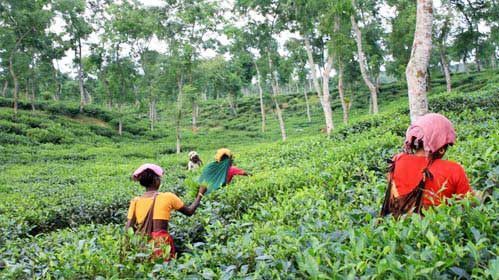
চলতি বছরের ১৩ জুন মজুরি বোর্ড চা শ্রমিকদের মজুরি ১১৭ থেকে ১২০ টাকা নির্ধারণ করে; এরপর থেকেই ক্ষোভ প্রকাশ করে আসছেন চা শ্রমিকরা।
চা চাষের ইতিহাস ১৬৭ বছর হলেও চা বাগানের শ্রমিকদের মজুরি এখন পর্যন্ত ১৬৭ টাকাও হয়নি। এরই মধ্যে দীর্ঘ ১১ বছর পর, ন্যূনতম মজুরি বোর্ড চা শ্রমিকদের জন্য খসড়া মজুরির সুপারিশকে চূড়ান্ত করেছে। তবে চা শ্রমিকরা এবং তাদের সংগঠনগুলো এই খসড়ার প্রতিবাদ করে বলেছেন যে, চা বাগান শ্রমিকদের জন্য মজুরি বোর্ডের দ্বারা নির্ধারিত দৈনিক মজুরি গ্রহণযোগ্য নয়। ন্যূনতম মজুরি বোর্ড চা শ্রমিকদের সুবিধাগুলো বাড়ানোর কথা বললেও এই গেজেটে তা হ্রাস করা হয়েছে।
চা-বাগান শিল্পের জন্য গঠিত নিম্নতম মজুরি হারের খসড়া সুপারিশ বাতিলের দাবি জানিয়েছে বি এ এস এফ এবং বাংলাদেশ চা শ্রমিক ইউনিয়ন। তাদের দাবি, ‘২০১৯ সালের জানুয়ারী থেকে আমরা যেখানে ১১৭-১২০ টাকা মজুরি পাচ্ছি সেখানে সেই মজুরি পাওয়ার আড়াই বছর পর মজুরি বোর্ড আবার ১১৭-১২০ টাকা নির্ধারণ করে দিয়ে যে খসড়া প্রকাশ করেছে সেটা হাস্যকর এবং অগ্রহণযোগ্য’।
চলতি বছরের ১৩ জুন মজুরি বোর্ড চা শ্রমিকদের মজুরি ১১৭ থেকে ১২০ টাকা নির্ধারণ করে; এরপর থেকেই ক্ষোভ প্রকাশ করে আসছেন চা শ্রমিকরা।
চা শ্রমিক ইউনিয়ন জানায়, ২০১৯ সালের অক্টোবরে মজুরি বোর্ড গঠন করা হয়। ৬ মাসের ভেতর এই বোর্ডের রিপোর্ট করার কথা থাকলেও করোনা বা বিভিন্ন কারণে তা করেনি তারা। বর্তমানে প্রায় আড়াই বছর পর চলতি মাসের ১৩ তারিখ মজুরি বোর্ড তাদের খসড়া প্রকাশ করেছে যেখানে চা শ্রমিকদের দৈনিক মজুরি ১১৭ থেকে ১২০ টাকা নির্ধারণ করেছে। অথচ এই খসড়া প্রকাশের আগে ২০১৯ সালের জানুয়ারী থেকে চা শ্রমিকরা ১১৭ থেকে ১২০ টাকা পাচ্ছে । তাদের দাবি ছিল ৩০০ টাকা দৈনিক মজুরি।
২০২০ সালের ১৩ অক্টোবর চা-বাগানের মালিকপক্ষের সংগঠন বাংলাদেশ চা-সংসদের (বিটিএ) সঙ্গে চা-শ্রমিক ইউনিয়নের চুক্তি সম্পাদন হয় তার প্রেক্ষিতে ২০১৯ সালের ১ জানুয়ারি থেকে ১১৭ থেকে ১২০ টাকা দৈনিক মজুরি পাচ্ছেন চা শ্রমিকরা। তবে এই চুক্তির মেয়াদও প্রায় ৬ মাস অতিক্রম করেছে। প্রতি দুই বছরের জন্য এই চুক্তি মালিকপক্ষ ও শ্রমিকপক্ষের মধ্যে হয়ে থাকে। সর্বশেষ চুক্তির মেয়াদ শেষ হয়েছে ২০২০ সালের ৩১ ডিসেম্বর। একে তো চুক্তি মেয়াদ অতিক্রম করে ৬ মাস চলে গেছে, তার ওপর যে মজুরি বোর্ডের প্রতি তাদের প্রত্যাশা ছিল ৩০০ টাকা দৈনিক মজুরি, বছরে ২ মাসের বেতন বোনাস হিসেবে দেবে, সেই মজুরি বোর্ডের খসড়ায় বর্তমান মজুরিকেই আবার সুপারিশ করায় তারা চরম হতাশায় পড়েছেন।
এর আগে ২০১০ সালে মজুরি বোর্ড দৈনিক মজুরি ৪৮ টাকা নির্ধারণ করে। এরপর থেকে মালিকপক্ষের সাথে প্রতি দুইবছর পর পর শ্রমিকদের যে চুক্তি হয়ে থাকে তার প্রেক্ষিতে বর্তমানে মজুরি ৪৮ টাকা থেকে ১১৭-১২০ টাকা হয়েছে। ২০১০ সালের দীর্ঘ ১১ বছর পর, ‘চা-বাগান’ শিল্প খাতে ন্যূনতম মজুরি বোর্ড ২০২১ সালের ১৩ জুন একটি গেজেট আকারে খসড়া মজুরির সুপারিশ প্রকাশ করে তাতে বাড়েনি চা শ্রমিকদের দৈনিক মজুরি বা অন্যান্য সুযোগ সুবিধা।
====
চা–শ্রমিকের দৈনিক মজুরি ১২০ টাকার খসড়ায় আপত্তি
Published 21 June 2021 1 min read By Bangladesh AnarchoSyndicalist Federation – BASF
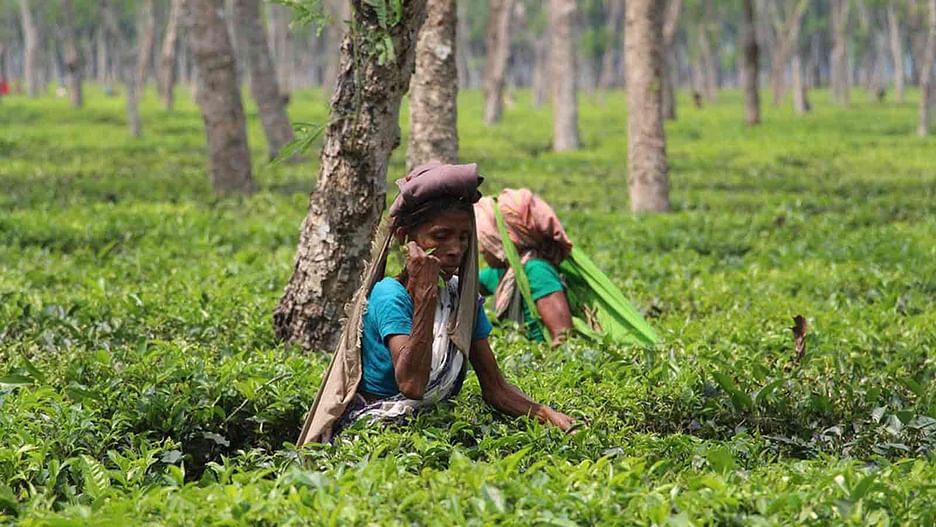
চা–শ্রমিকের দৈনিক মজুরি ১২০ টাকার খসড়ায় আপত্তি
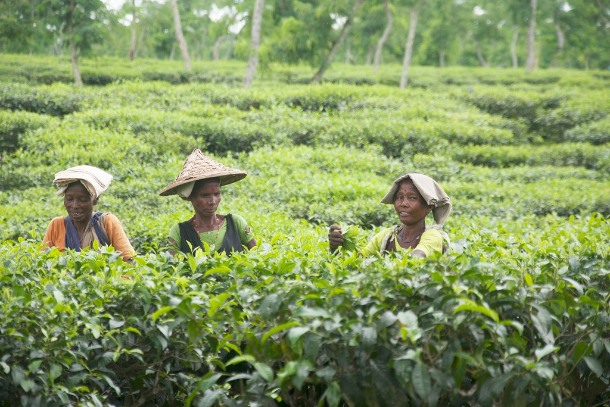
[ বাংলাদেশ এনার্কোসিন্ডিক্যালিস্ট ফেডারেশন- বিএ এস এফ সূদির্ঘ কাল থেকে চা প্রমিকদের ন্যায্য মজুরী আদায় ও অন্যান্য অধিকার নিয়ে কাজ করছে। বিএ এস এফ মনে করে চা প্রমিকদের দাবী দাওয়া মানবিক ভাবে সরকার ও চা বাগান মালিকদের বিবেচনা করা উচিৎ। দেশের অন্যান্য শ্রমিকগন যে হারে মজুরী পায় বা অন্যান্য সুযোগ সুবিধা পেয়ে থাকেন চা শ্রমিকগন তা থেকে নানা ভাবে বঞ্চিত। তাঁদের সকল প্রকার বঞ্চনার অবসান হোক। সম্প্রতি চা শ্রমিকদের মজুরী পুনঃ নির্ধান করা হয়েছে। যা একেবারে সন্তোষজনক নয়। তাই চা শ্রমিক সংগঠন সমূহ তা প্রত্যাখ্যান করে চা শ্রমিকদের দাবী অনুসারে কমপক্ষে ৩০০ টাকা মজুরী পুনঃ নির্ধারনের জন্য দাবী উত্থাপন করেছে।]
বাগানভেদে স্থায়ী চা–শ্রমিকের ন্যূনতম দৈনিক মজুরি হবে ১১৭-১২০ টাকা। তার বাইরে আবাসন, ভর্তুকি মূল্যে চাল বা আটা, বছরে দুটি উৎসব ভাতাসহ অন্য সুযোগ-সুবিধা পাবেন। আর শিক্ষানবিশ শ্রমিকের দৈনিক মজুরি ১১০ টাকা।
নিম্নতম মজুরি বোর্ড চা–বাগানশিল্পের শ্রমিকদের জন্য খসড়া মজুরির এই সুপারিশ চলতি মাসে চূড়ান্ত করেছে। তবে এই বোর্ডে
চা–বাগানশিল্পের শ্রমিকপক্ষের অস্থায়ী প্রতিনিধি রাম ভজন কৈরী খসড়া সুপারিশে আপত্তি জানিয়ে তাতে স্বাক্ষর দানে বিরত থাকেন। নিম্নতম মজুরি বোর্ডের চেয়ারম্যান সুলতান মাহমুদসহ অন্য চার সদস্য খসড়ায় স্বাক্ষর করেছেন। বর্তমানে খসড়ার ওপর লিখিতভাবে আপত্তি বা সুপারিশ গ্রহণ করছে বোর্ড।
জানতে চাইলে রাম ভজন কৈরী গতকাল প্রথম আলোক বলেন, ‘দুই বছর অন্তর চা–বাগানমালিক ও শ্রমিকপক্ষের মধ্যে চুক্তির ভিত্তিতে মজুরি সমন্বয় করা হয়। সেই চুক্তির ভিত্তিতেই গত বছর বাগানভেদে ১১৭-১২০ টাকা দৈনিক মজুরি নির্ধারণ করা হয়। মজুরি বোর্ডে আমরা জীবনধারণের জন্য প্রয়োজনীয় মজুরি হিসাব করে দৈনিক ৩০০ টাকা করার দাবি করেছিলাম। অন্যদিকে বার্ষিক দুই উৎসবের প্রতিটিতে মূল মজুরির সমান ভাতা দাবি করেছিলাম। সেটিও মানা হয়নি।’
বিষয়টি নিয়ে মালিকপক্ষের প্রতিনিধি তাহসীন আহমেদ চৌধুরীর সঙ্গে যোগাযোগ করা হলেও তাঁর বক্তব্য পাওয়া যায়নি।
খসড়া সুপারিশ অনুযায়ী, এ শ্রেণি এবং ক্যাটাগরি-১ চা–বাগানের স্থায়ী ও সাময়িক শ্রমিকের দৈনিক মজুরি হবে ১২০ টাকা। বি শ্রেণি এবং ক্যাটাগরি-২ চা–বাগানের শ্রমিকের দৈনিক মজুরি ১১৮ টাকা। আর সি শ্রেণি এবং ক্যাটাগরি-৩ চা–বাগানের শ্রমিকের দৈনিক মজুরি হবে ১১৭ টাকা। ওপরের গ্রেডের ইলেকট্রিশিয়ান, ড্রেসার, সরদার, মিস্ত্রি, লেদ অপারেটর, ধাই, পিয়নের মাসিক মজুরি ৬ হাজার ৬৫০ টাকা। অন্যদিকে কর্মচারীদের সর্বনিম্ন মজুরি ৭ হাজার ৫৪২ টাকা। তবে শিক্ষানবিশ কর্মচারীদের মজুরি ৭ হাজার টাকা। এ ক্ষেত্রে শিক্ষানবিশকাল ছয় মাস হলেও শ্রমিকদের বেলায় তা তিন মাস।
খসড়ায় বলা হয়েছে, সিলেট, মৌলভীবাজার ও হবিগঞ্জের যেসব বাগানে বছরে ১ লাখ ৮০ হাজার কেজি বা তার বেশি চা উৎপাদিত হয়, সেগুলো এ শ্রেণির অন্তর্ভুক্ত। ১ লাখ ৮ হাজার থেকে ১ লাখ ৮০ হাজার কেজি পর্যন্ত চা উৎপাদনকারী বাগান বি শ্রেণির। অন্যদিকে চট্টগ্রাম, রাঙামাটি ও অন্য জেলার যেসব বাগানে ১ লাখ ১৩ হাজার কেজি বা তার বেশি চা উৎপাদিত হয়, সেগুলোর ক্যাটাগরি-১। আর যেসব বাগানে ৪৫ হাজার থেকে ১ লাখ ১৩ হাজার কেজি চা উৎপাদিত হয়, সেগুলোর ক্যাটাগরি-২।
খসড়া সুপারিশ অনুযায়ী, তিন বছর পরপর মজুরি বিষয়টি চা–শ্রমিক ইউনিয়ন ও মালিকপক্ষের সংগঠন বাংলাদেশ চা সংসদ সমঝোতার ভিত্তিতে সিদ্ধান্ত নেবে। বাগানের ভেতরে শ্রমিকদের পরিবারভিত্তিক আবাসন সুবিধা আগের মতোই বহাল রাখতে হবে। শ্রমিকেরা প্রধান দুই উৎসবে এক মাসের মূল মজুরি দুই ভাগে পাবেন। তা ছাড়া প্রচলিত নিয়ম অনুযায়ী, শ্রমিকেরা ভর্তুকি মূল্যে চাল বা আটা পাবেন। চা-বাগানের বিক্রির দশমিক শূন্য ৩ শতাংশ অর্থ শ্রমিকেরা অংশগ্রহণভিত্তিক মুনাফার অংশ হিসেবে বছরে একবার করে পাবেন।
প্রসঙ্গত, ১৮৪০ সালে চট্টগ্রামে প্রথম চা চাষ শুরু হয়। সিলেটে বাণিজ্যিক চা-বাগান চালু হয় ১৮৫৮ সালে। বর্তমানে দেশে চা-বাগানের সংখ্যা ১৬৭। এসব বাগানে কাজ করেন ১ লাখ ৪০ হাজার শ্রমিক। ২০১০ সালের মজুরি বোর্ড শ্রমিকের দৈনিক মজুরি ৪৫ টাকা নির্ধারণ করেছিল।
সূত্রঃ প্রথম আলো
===========
চা বাগানের শ্রমিকদের বকেয়া বেতন পরিশোধের দাবি
ublished 17 June 2021 1 min read By Bangladesh AnarchoSyndicalist Federation – BASF
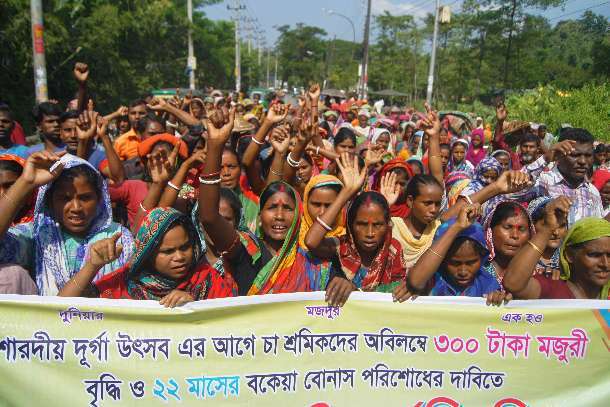
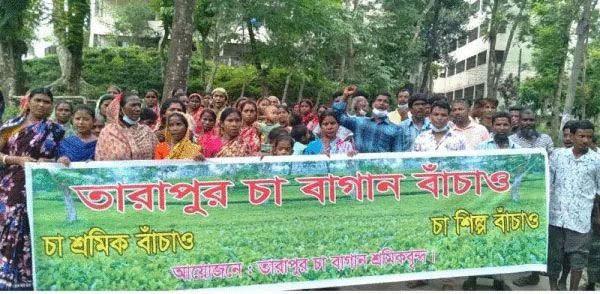
সিলেটের তারাপুর চা-বাগানে শ্রমিকদের বকেয়া বেতন পরিশোধসহ আন্দোলনরত চা শ্রমিকদের ৯ দফা দাবি মেনে নেওয়ার আহবান জানিয়েছে বি এ এস এফ সহ বাংলাদেশ চা শ্রমিক ফেডারেশন।
আজ রোববার (২৩ মে) বাংলাদেশ চা শ্রমিক ফেডারেশনের কেন্দ্রীয় নেতৃবৃন্দ এবং বাংলাদেশ চা শ্রমিক ফেডারেশন সিলেট জেলার সভাপতি রত্না বসাক ও সাধারণ সম্পাদক হৃদয় ছত্রী এক বিবৃতিতে এই দাবি জানান।
বিবৃতিতে বলা হয়, সিলেটের তারাপুর চা-বাগানের শ্রমিকরা বকেয়া বেতন পরিশোধসহ বিভিন্ন দাবিতে কয়েকদিন থেকে আন্দোলন করে আসছেন। এর ধারাবাহিকতায় গত বোরবার (২২ মে) তারাপুর চা-বাগানে সকাল থেকে কর্মবিরতি ও বিক্ষোভ করেন শ্রমিকরা। ইতিমধ্যে আন্দোলনরত চা শ্রমিকরা ৯ দফা দাবিতে সিলেট জেলা প্রশাসকের কাছে স্মারকলিপি প্রদান করেছেন। বি এ এস এফ এর সদস্যগন আন্দোলনের সকল পর্যায়ে সক্রিয় অংশগ্রহন করেন।
বিবৃতিতে নেতৃবৃন্দ বলেন, এমনিতেই চা শ্রমিকরা মজুরি বৈষ্যমের মধ্যে আছেন। এর মধ্যে বেতন-ভাতা বন্ধ হয়ে গেলে যেমন চা শ্রমিকদের জীবন অচল হয়ে পরে তেমনি চা বাগানও অচল হয়ে যায়। তাই দ্রুত সময়ের মধ্যে বাগানের শ্রমিকদের বকেয়া বেতন পরিশোধের দাবি জানান নেতৃবৃন্দ।